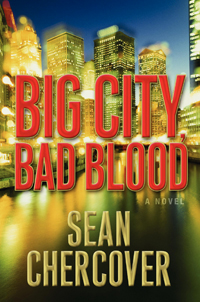 William Morrow Books, January 2007, £23.95, ISBN 0061128678
William Morrow Books, January 2007, £23.95, ISBN 0061128678Ray Dudgeon thinks a little bodyguard gig shouldn’t be too hard. He’s protecting a witness for the prosecution in a case against the Chicago Outfit. But he already knows the Outfit don’t give a rat’s ass about what some Hollywood producer thinks he might have seen. His contacts have assured him there’s nothing to worry about. Its extra cash to babysit some guy, and Ray’s fine with that. But in Chicago, nothing ever works out so easy and soon enough Ray’s fighting not only to keep his client alive, but to save his own skin as well.
Sean Chercover’s debut novel is a smoothly written PI thriller that not only understands its roots – there’s more than a few knowing nods to the PI’s long established literary history – but knows enough to avoid the old clichés as well. Ray Dudgeon is Sam Spade and Philip Marlowe as they would be if they’d grown up in the latter half of the twentieth. He’s a man alone, but he’s a man who needs to know himself as well. He’s a charming, witty storyteller, but he knows his business and he knows when to be serious.
It helps, perhaps, that Chercover used to be a PI himself, this experience adding some depth to the business side of his protagonist, while never threatening to overshadow the fictional narrative. In fact. Chercover perfectly walks the usual PI tightrope of unbelievably dramatic events and the necessity of presenting a PI in a realistic light. Ray’s character works because that air of authenticity helps you to believe he is an actual working PI, complete with just the right amount of complexity necessary to promote interest in his character, but little overblown melodrama about his past.
If there are problems, it is that on occasion Ray’s narrative can occasionally seem somewhat flippant and light; there are certain wiseass moments that come across as slight missteps on behalf of Ray. Particularly moments where he refers to himself via phrases such as: Ray Dudgeon – the grovelling detective. These self-deprecatory statements can seem out of step both with the mis-en-scene of the novel and with Ray’s character.
When the narrative flies, however, it shares a great deal in common with Lawrence Block or Robert Crais at their best – a sense of rhythm imbued with character and atmosphere that pulls the reader into Ray’s world. But this is no “greatest hits” rerun of PI writers past. Chercover’s energy comes from his own unique riffs on his predecessor’s work.
Writers always talk about showing but not telling, and Chercover has taken this advice to heart. This is what gives the novel its energy: the narrative runs on action, barely pausing for breath as we dive headfirst into Dudgeon’s world.
And it’s a hell of a world, too. Chercover’s Chicago is realised brilliantly. His passion for the city is very much in evidence, and he is unafraid to present it both as an exciting place – the home of the blues – and a city where corruption and crime are as much a part of the history as anything else. It’s no accident that the novel is named for the city above the character. There’s a lot of bad blood running in the streets of Chicago. The motivation, as ever, is greed and money; themes well suited to the Home of the Blues.
There have been rumblings recently that the PI story is dead, but with writers like Chercover – who both respect the roots of the PI and help bring the genre kicking and screaming into the new millennium – it looks as if the diagnosis is premature.
Big City, Bad Blood is a refreshingly readable, tensely gripping debut novel. With its highly readable prose, its highly realised setting and its empathetic protagonist, Sean Chercover’s debut novel is a fantastic read, marking his future work as something to be highly anticipated.
Russel D McLean for crimescenescotland, November, 2006

